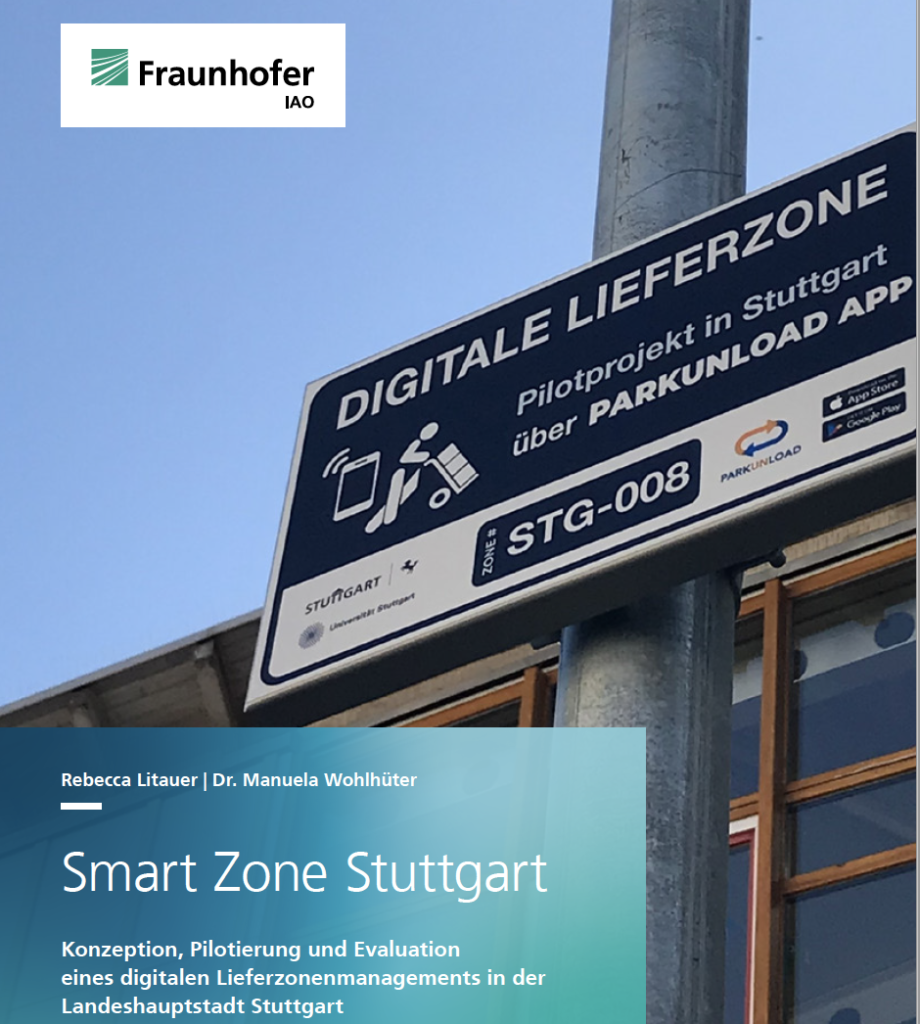How can urban freight in densely populated cities be organized smartly and sustainably? The final report of the joint project Smart Zone Stuttgart, commissioned by the state capital Stuttgart, the Fraunhofer IAO, the cooperating IAT of the University of Stuttgart, and ParkUnload shows what digital delivery zone management in the state capital can look like and how urban logistics data can be used sensibly.
Improving delivery zone management
To improve delivery zone management in the densely populated and busy state capital of Stuttgart, the Fraunhofer Institute for Industrial Engineering IAO, together with the cooperating Institute for Industrial Engineering and Technology Management IAT of the University of Stuttgart and the Spanish technology and platform provider ParkUnload SL, launched Germany’s first pilot project on the topic of digital delivery zones on behalf of the state capital of Stuttgart in November 2020.
The “Smart Zone Stuttgart” project aimed to pilot an approach to collect and control commercial traffic data in real-time using digital technologies to enable intelligent control of delivery traffic in the city. The German Federal Ministry of Digital Affairs and Transport (BMDV) funded the project as part of the Clean Air Emergency Programme. The digitally supported delivery zone management is based on a smartphone app and sensor-based signs. With the app introduced, delivery service providers such as Hermes, DHL, DPD, and UPS could check the availability of free delivery zones in real-time. The application enabled a direct approach to the free delivery zones. When the delivery zone was reached, it was marked as occupied by others in the app via Bluetooth, and the delivery person could use the space for the loading and unloading process. In the project’s final report, the research team shares its findings, which have been scientifically evaluated, and provides recommendations for action.
Digitization of public delivery areas requires cooperation
With the findings from the pilot project, a decisive contribution was made on the way to digitalizing municipal transport systems. Testing a new technology for delivery traffic in public street spaces made it possible to confirm the acceptance of such an app among the participating delivery companies. The pilot project results also show potential for digitalized delivery zones or a generally digitalized occupancy display in the street space. But for this to be successfully implemented, cities should, in the future, provide relevant real-time data on street space usage so that app providers and other technology developers can build on it. “We have found that in the future, data collection, processing, and, in particular, provision by municipalities should increasingly be at the forefront of further research work.
Municipalities need early advice on digital solutions, data analysis tools, and platforms. It is not the task of the municipalities to provide the final technologies, but municipalities can set the appropriate framework conditions,” says Rebecca Litauer from Fraunhofer IAO.
Important insights were gained into the requirements for the digitalization of delivery zones in terms of traffic law (e.g., compatibility with road traffic regulations), process-related (e.g., integration into existing systems), and spatial (e.g., selection of suitable zones) aspects.
City logistics and the associated impacts on roads and land need to be communicated more clearly, and the implementation of pilot projects involving all responsible stakeholders needs to be pushed more strongly. In this context, municipal offices, delivery services, and research institutes have to cooperate across the board, and tradespeople and citizens have to be involved.

Findings from the pilot project
With the pilot project “Smart Zone Stuttgart,” the first relevant insights could be gained for all cities across Germany that deal with the digitalization of delivery zones. During the project, there was already an exchange of content with other cities, including Berlin, Hamburg, Munich, and Bonn. Especially given the current challenges, such as the effects of COVID-19 on the ordering culture in both the commercial and private sectors, the ongoing shortage of skilled workers in the logistics industry, and the intensified competition for space in urban areas, sustainable concepts with an area-wide standardization claim are now all the more necessary. Against this backdrop, the findings from the pilot project can be used for a cross-city exchange to develop a basis for standardized, digital delivery zone management and for collecting quantitative data on commercial traffic.
Stuttgart plans to analyze the situation of the delivery zones in 2022 as part of the concept of a “Liveable city center for all” with an in-depth study and to examine technological possibilities to organize delivery processes in the city center in a more sustainable and demand-oriented manner in the future and to be able to coordinate them better. These ideas and considerations can then be integrated into a city-wide city logistics concept for the state capital.
Source: Fraunhofer
